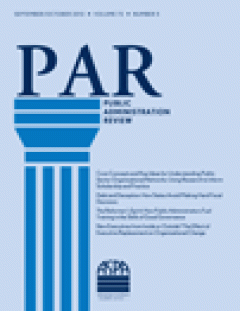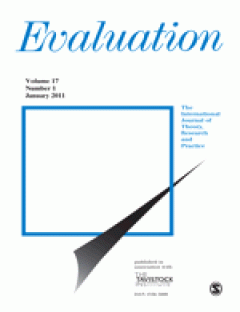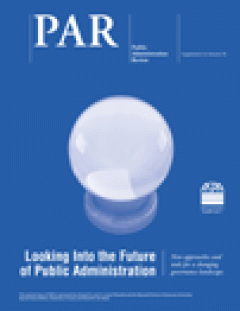Filter by

Administration without Borders
To thrive in 2020, we must conceive of the field of public administration in the broadest possible terms. Phenomena that typically have been treated peripherally in our literature are emerging center stage in recent years, confirming that the “old” boundaries of our discipline do not reflect contemporary reality. After reviewing three key developments—the rise of mixed and nongovernmental insti…
- Edition
- Volume 70, Issue Supplement s1, December 2010, pag
- ISBN/ISSN
- 00333352
- Collation
- -
- Series Title
- Public Administration Review
- Call Number
- -

The Rise and Fall of Discipline : Economic Globalization, Administrative Refo…
Throughout the era of economic liberalization (1978–2007), a significant amount of governmental power was transferred to technocrat-guardians who were carefully buffered from elected officials. Democratic processes, it was said, had to be disciplined through such reforms if nations were to thrive in a globalized economy. This way of thinking about reform was already under assault before the fin…
- Edition
- Volume 70, Issue Supplement s1, December 2010, pag
- ISBN/ISSN
- 00333352
- Collation
- -
- Series Title
- Public Administration Review
- Call Number
- -

Minnowbrook IV in 2028 : From American Minnowbrook to Global Minnowbrook
The first Minnowbrook Conference in 1968 was a big success. The ideas and directions that the field of public administration followed later on were very much influenced by the spirit of Minnowbrook I. Since then, it has become a practice for American scholars in the field of public administration to meet every 20 years to discuss the future direction of the field. Thus, we had Minnowbrook II in…
- Edition
- Volume 70, Issue Supplement s1, December 2010, pag
- ISBN/ISSN
- 00333352
- Collation
- -
- Series Title
- Public Administration Review
- Call Number
- -

Leading in the Shared-Power World of 2020
Imagine that citizens and public officials working together over the next decade are able to maximize the democratic potential of today’s shared-power, “no-one-in-charge” world and achieve more sustainable modes of living together on Earth. The article focuses on the development of shared or collaborative approaches to leadership, ideas for developing integrative leadership practices that harne…
- Edition
- Volume 70, Issue Supplement s1, December 2010, pag
- ISBN/ISSN
- 00333352
- Collation
- -
- Series Title
- Public Administration Review
- Call Number
- -

Sustainability as a Conceptual Focus for Public Administration
This article argues that sustainability should define the conceptual focus for the field of public administration in the coming decade. Sustainability involves three systems: environmental, economic, and political/social systems. The challenge of governance, and thus of public administration, is to sustain each of these systems on its own while maintaining an appropriate balance among them. The…
- Edition
- Volume 70, Issue Supplement s1,December 2010, page
- ISBN/ISSN
- 00333352
- Collation
- -
- Series Title
- Public Administration Review
- Call Number
- -

Ecological Governance : Organizing Principles for an Emerging Era
The significant reforms being implemented in governance systems around the world reflect a broader transition of society from the modern to a new emerging era. This transition is framed in terms of a shift from a mechanistic to an ecological worldview, stimulated by a number of developments during the twentieth century and the last decade. In contrast to the mechanistic orientation toward reduc…
- Edition
- Volume 70,Supplement s1,December 2010,pages s89–s9
- ISBN/ISSN
- 00333352
- Collation
- -
- Series Title
- Public Administration Review
- Call Number
- -

Toward a Platinum Standard for Evidence-Based Assessment by 2020
The authors argue for a scientifically rigorous, contextually valid, practically relevant, and stakeholder-inclusive Platinum Standard for evidence-based assessment to improve public administration and third-party governance in the twenty-first century. The Platinum Standard would encompass two contending gold standards. The first gold standard, based on experimental methods, counterfactuals, a…
- Edition
- Volume 70,Suppl s1, December 2010,pages S100–109
- ISBN/ISSN
- 00333352
- Collation
- -
- Series Title
- Public Administration Review
- Call Number
- -

Employing the teacher-learner cycle in realistic evaluation : A case study of…
The teacher—learner cycle has been presented as an integral part of the realistic evaluation approach by Pawson and Tilley. Yet few studies have adopted this cycle explicitly and no studies were found in which the whole cycle was completed.We fill this gap through a case study of the effect of young people’s playing fields on anti-social behaviour in a Dutch community.The initiators of these fi…
- Edition
- Vol. 17 no. 1, January 2011.pp. 73-87
- ISBN/ISSN
- 13563890
- Collation
- -
- Series Title
- Evaluation
- Call Number
- -

At Your Service? Volunteering and National Service in 2020
This article evaluates the potential of the Edward M. Kennedy Serve America Act of 2009 to raise the level of volunteering and national service in the United States, particularly among young people, and its implications for public administration in 2020. The act would increase service-learning opportunities and national service placements substantially. Research suggests that participation in t…
- Edition
- Vol 70, Issue Suppl s1, Dec 2010. pages S107–S113
- ISBN/ISSN
- 00333352
- Collation
- -
- Series Title
- Public Administration Review
- Call Number
- -

The Future of National Service
Passage of the Serve America Act in 2009, reauthorizing the nation’s national and community service programs, represented an important milestone. It was the first time these programs and its parent government agency, the U.S. Corporation for National and Community Service, were reauthorized by Congress since the early 1990s. While advocates of national and community service have hailed the pass…
- Edition
- Vol 70, Issue Suppl s1, Dec 2010. pages s114–s121
- ISBN/ISSN
- 00333352
- Collation
- -
- Series Title
- Public Administration Review
- Call Number
- -

Governance Infrastructures in 2020
A governance infrastructure is the collection of technologies and systems, people, policies, practices, and relationships that interact to support governing activities. Information technology, especially communication and computational technologies, continues to augment society’s ability to organize, interact, and govern. As we think about the future of governance, this article challenges us to…
- Edition
- Vol 70, Issue Suppl s1, Dec 2010, pages s122–s128
- ISBN/ISSN
- 00333352
- Collation
- -
- Series Title
- Public Administration Review
- Call Number
- -

Practitioner's Perspective—Managing for 2020 : An Exploration of Role Inter…
This article examines three roles that local governments play: convening community, providing service, and creating and enforcing regulation. The author uses the concept of polarity management to explore how local governments can strike a balance among these roles, and explores how individual employees and organizations can disrupt that balance by favoring individual roles. Particular focus is …
- Edition
- Vol 70, Issue Suppl s1, Dec 2010, pages s129–s136
- ISBN/ISSN
- 00333352
- Collation
- -
- Series Title
- Public Administration Review
- Call Number
- -

Governing Cities in the Coming Decade : The Democratic and Regional Disconnects
How will cities be governed in 2020? The answer will depend to a significant degree on reducing two “disconnects”: one between municipal government and its citizenry, and the other between municipal government and its region. Elected, managerial, and intellectual leaders need to strengthen their understanding, capacities, and skills regarding public engagement and regional engagement across jur…
- Edition
- Vol 70, Issue Suppl s1, Dec 2010, pages s137–s144
- ISBN/ISSN
- 00333352
- Collation
- -
- Series Title
- Public Administration Review
- Call Number
- -

The Future of Local Government : Twenty-First-Century Challenges
Local governments in the twenty-first century face challenges regarding service delivery, finance, the workforce, and citizen engagement. While privatization was a major innovation in the last decades of the twentieth century, lack of costs savings and the loss of public values in market provision are prompting reversals in privatization, increases in regulation, and new approaches to governmen…
- Edition
- Vol 70, Issue Suppl s1, Dec 2010, pages s145–s147
- ISBN/ISSN
- 00333352
- Collation
- -
- Series Title
- Public Administration Review
- Call Number
- -

What if Hurricane Katrina Hit in 2020? The Need for Strategic Management of D…
What would another Hurricane Katrina bring in 2020? Is government at all levels ready for such an event? This essay argues that learning to manage actions supporting disaster response and recovery operations consistently and effectively requires strategic, not reactive, thinking. It adopts a framework based in issues focused thinking, externally focused management, and opportunity-seeking behav…
- Edition
- Vol 70, Issue Suppl s1, Dec 2010, pages s201–s207
- ISBN/ISSN
- 00333352
- Collation
- -
- Series Title
- Public Administration Review
- Call Number
- -

The Suspect Handmaiden : The Evolution of Politics and Administration in the …
Scholars of an earlier era predicted a more secure role for the administrative state in American political culture. This vision overlooked a historical irony that governs the relationship between politics and administration. For American society, the administrative state is a suspect handmaiden. Citizens have looked to public administration to enable extraordinary growth while simultaneously di…
- Edition
- Vol 70, Issue Suppl s1, Dec 2010, pages s229–s237
- ISBN/ISSN
- 00333352
- Collation
- -
- Series Title
- Public Administration Review
- Call Number
- -

The Public Service of the Future
This article seeks to identify the status and infrastructure of public service in 2020. It first examines Leonard White’s early effort at predicting a future search for public service, written in 1942, but with an eye toward the 1950s and 1960s. The authors assess the subsequent structural and ideological development of public service to lay a framework for their own projection of the public se…
- Edition
- Vol 70, Issue Suppl s1, Dec 2010, pages s238–s245
- ISBN/ISSN
- 00333352
- Collation
- -
- Series Title
- Public Administration Review
- Call Number
- -

The Future of Strategic Planning in the Public Sector : Linking Strategic Man…
- Edition
- Vol 70, Issue Suppl s1, Dec 2010, pages s246–s254
- ISBN/ISSN
- 00333352
- Collation
- -
- Series Title
- Public Administration Review
- Call Number
- -
- Edition
- Vol 70, Issue Suppl s1, Dec 2010, pages s246–s254
- ISBN/ISSN
- 00333352
- Collation
- -
- Series Title
- Public Administration Review
- Call Number
- -

The Future of Public and Nonprofit Strategic Planning in the United States
Strategic planning is now a ubiquitous practice in U.S. governments and nonprofit organizations. The practice has become widespread for many reasons, but the chief one is the evidence that strategic planning typically “works,” and often works extremely well. Improvements in strategic planning practice are likely to come as it is seen and researched in its full richness as a practice, or set of …
- Edition
- Vol 70, Issue Suppl s1, Dec 2010, pages s255–s267
- ISBN/ISSN
- 00333352
- Collation
- -
- Series Title
- Public Administration Review
- Call Number
- -

Harris's Mirage : The Positive Service State
In 1942, Joseph Harris anticipated that the United States would develop a highly centralized and rationalized welfare state. The forecast was largely mistaken. The United States did develop an expansive national security apparatus that was relatively centralized and rationalized. By contrast, domestic policies were unevenly developed, and often highly decentralized in design. Harris’s forecast …
- Edition
- Vol 70, Issue Suppl s1, Dec 2010, pages s268–s272
- ISBN/ISSN
- 00333352
- Collation
- -
- Series Title
- Public Administration Review
- Call Number
- -
 Computer Science, Information & General Works
Computer Science, Information & General Works  Philosophy & Psychology
Philosophy & Psychology  Religion
Religion  Social Sciences
Social Sciences  Language
Language  Pure Science
Pure Science  Applied Sciences
Applied Sciences  Art & Recreation
Art & Recreation  Literature
Literature  History & Geography
History & Geography